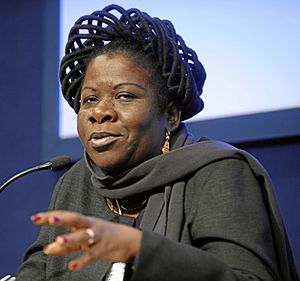Luísa Diogo facts for kids
Quick facts for kids
Luísa Diogo
|
|
|---|---|

Diogo in 2009
|
|
| 11th Prime Minister of Mozambique | |
| In office 17 February 2004 – 16 January 2010 |
|
| President | Joaquim Chissano Armando Guebuza |
| Preceded by | Pascoal Mocumbi |
| Succeeded by | Aires Ali |
| Minister of Economy and Finance | |
| In office 2000–2005 |
|
| Preceded by | Tomaz Salomão |
| Succeeded by | Manuel Chang |
| Personal details | |
| Born | 11 April 1958 Magoé, Portuguese Mozambique |
| Died | 16 January 2026 (aged 67) |
| Political party | FRELIMO |
| Alma mater | Eduardo Mondlane University University of London |
Luísa Dias Diogo (born 11 April 1958 – died 16 January 2026) was an important politician from Mozambique. She served as the Prime Minister of Mozambique from February 2004 to January 2010. She was the first woman to hold this high position in her country.
Before becoming Prime Minister, she was the Minister of Planning and Finance. She continued in that role for a short time after becoming Prime Minister. Luísa Diogo was a member of the FRELIMO party. This party has led Mozambique since it became independent in 1975.
Contents
About Luísa Diogo
Early Life and Education
Luísa Diogo grew up in Magoé, which was then part of Portuguese Mozambique. She was always keen on learning. She studied economics at Eduardo Mondlane University in Maputo. She earned her first degree in 1983.
Later, she continued her studies in England. She received a master's degree in financial economics in 1992. This advanced degree was from the School of Oriental and African Studies at the University of London.
Her Career Journey
Luísa Diogo started working early in her career. She joined the Mozambique Finance Ministry in 1980 while still a university student. She quickly moved up in her career. By 1986, she became a department head. In 1989, she was named the national budget director.
After her work in the ministry, she joined the World Bank. There, she worked as a program officer in Mozambique. In 1994, she returned to government. She became the Deputy Minister of Finance under President Joaquim Chissano.
In 2003, United Nations Secretary-General Kofi Annan recognized her skills. He asked her to join a special United Nations Commission. This commission focused on how private businesses could help with development.
Prime Minister of Mozambique
Luísa Diogo became the Prime Minister of Mozambique in February 2004. She took over from Pascoal Mocumbi. He had been Prime Minister for nine years. She was the first woman to ever hold this powerful role in Mozambique.
She continued to serve as the finance minister until February 2005. This showed her strong commitment to the country's economy.
Important Work as Prime Minister
As Prime Minister, Luísa Diogo worked on many important issues. In September 2005, she was a special international speaker. She spoke at the British Labour Party Conference.
In 2006, Kofi Annan again asked for her help. He appointed her to co-chair a High-level Panel on United Nations Systemwide Coherence. This group looked at how the United Nations could work better. They focused on development, helping people in need, and protecting the environment.
She also joined another important group in 2008. This was the Commission on Effective Development Cooperation with Africa. It was set up by the Prime Minister of Denmark.
During her time, Mozambique faced a big challenge. In 2007, there were severe floods in the Zambezi valley. Some farmers did not want to leave their homes and animals. Prime Minister Diogo ordered people to be moved to safety. This was to protect them from the dangerous floodwaters.
Luísa Diogo was a strong supporter of health and equality. She encouraged health ministers across Africa. She wanted them to offer free health services for families. These services aimed to improve the health of mothers and babies. They also worked to help stop the spread of certain diseases. Her goal was to promote fairness between boys and girls.
She also focused on helping women gain more power and opportunities. She helped launch a "Network of Women Ministers and Parliamentarians" (MUNIPA). This network worked to create laws and policies that support women's equality. Promoting fairness for everyone was a key goal for the Mozambican government.
After Her Time as Prime Minister
After leaving the Prime Minister's office in 2010, Luísa Diogo continued her important work. Ban Ki-moon, the UN Secretary-General, appointed her to a panel. This panel focused on making the world more sustainable for the future.
In 2014, she ran for president within her FRELIMO party. She came in second place to Filipe Nyusi.
In 2016, she was appointed to another high-level panel. This group looked at the future of development aid.
Her Legacy and Other Roles
Luísa Diogo was a respected leader. She served on the board of Absa Bank Mozambique as its Chairwoman starting in 2012.
She was also a member of several non-profit organizations. These included the African Union Foundation, the Brenthurst Foundation, and the Club de Madrid. She was also a member of the Council of Women World Leaders.
In 2010, the famous musician and activist Bono wrote about her. He described her as having "the lioness energy" of other strong African women leaders.
Luísa Diogo passed away on 16 January 2026, at the age of 67. Her work left a lasting impact on Mozambique and beyond.
See also
 In Spanish: Luisa Diogo para niños
In Spanish: Luisa Diogo para niños
 | Ernest Everett Just |
 | Mary Jackson |
 | Emmett Chappelle |
 | Marie Maynard Daly |

